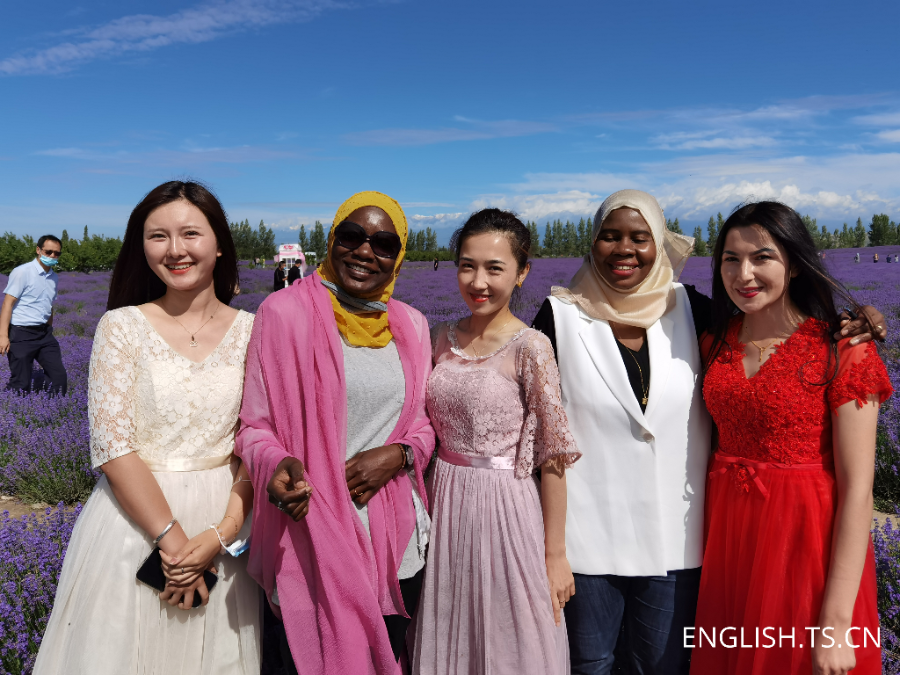It was on Saturday, the 19th of June, 2021. I set out for Xinjiang. After a slightly more than four-hour flight, we finally landed in Urumqi. Till today, I say, I fell in love with Xinjiang the very first moment I set my foot in the airport.
To be honest, my trip to Xinjiang was more tourism and leisure than work, as I did a lot of sightseeing and exploration to clear my head.
For instance, I wish you could see the big smile on my face when I suddenly remember my visit to the famous Tianshan Tianchi, a well-known tourism site in Xinjiang. I consider it the epitome of Nature’s Beauty; green tall mountains, green grassland, trees, a beautiful lake, and waterfalls. The sound of water gushing, birds chirping and the cool atmosphere gave me a sense of serenity that I never really imagined possible in Xinjiang. And the glaciers? That was the first time in my life I had come so close to such beauty! It was magical and picturesque.
Imagine being in a slow-moving boat, enjoying a cup of warm milk tea, the sight of a clear blue sky, surrounded by green plants, and then looking directly at glaciers! Indeed, beauty lies in nature.
It is said that Rome was not built in a day, and this beauty I had just experienced was definitely not built in a day. In fact, it took the authorities the better part of 30 years to achieve it. Thirty years of hard work - planting trees, banning grazing and fishing - 30 years of strict measures. As the people's welfare lies at the core of policymaking in China, the authorities are always trying to strike a balance among complex options. There is an admirable quality in China’s administration at all levels of government.
I was later privileged to visit Sayram Lake. If you are a thalassophile like me, then you would have some idea of my excitement at being near water. It was the best feeling I had had in a long time. It also provided me with evidence of the government’s commitment to environmental protection.
The next stop was Sigong Village of Huocheng County, dubbed “One Village, One Product.” For the first time in my life, I found myself right in the middle of a lavender field. I had hitherto only been familiar with lavender-scented products. Yet, there I was, mesmerized by the beauty of the purple petals, their scent, and the calming and captivating sight.

I was struck by the ability to adapt techniques in order to improve the lives of the villagers. Lavender cultivation was adopted because Sigong’s soil is unsuitable for food crops. However, Sigong’s meteorological and soil conditions are similar enough to those of Provence, France, which is world-famous for its lavender fields. In order to lift the villagers out of poverty, cultivating lavender was proposed as an alternative.
Initially, the farmers were skeptical about growing flowers, because historically, no matter what crop they grew, their yields were always lower than those of other nearby villages. So, the officials had to redouble their efforts to convince the villagers. Fast-forward to the present day, and the economic benefits of planting lavender far outstrip whatever food crops could offer. Twenty years later, the lavender plantation occupies 96 percent of the land in the village. Additionally, it has bestowed popularity on the village, attracting thousands of tourists and simultaneously creating a thriving tourism industry.
Indeed, it is difficult not to appreciate the beauty that lies in that land. My creative spirit was rekindled, words long fermented in my head, gushing out in my writing like mountain falls.
I wish people would see Xinjiang through my eyes. I would not trade my experience for anything. Like an inscription on a mountain, the memories of my trip to Xinjiang will forever remain indelible in my heart.
Faiza Muhammad Mustapha is from Nigeria and is currently a senior journalist at CGTN.
Producer: Xiao Chunfei
Supervisors: Ding Tao and Jie Wenjin
Planners: Jie Wenjin and Cheng Li
Reviewers: Cheng Li and Hou Weili
Editor: Zhang Shijie









